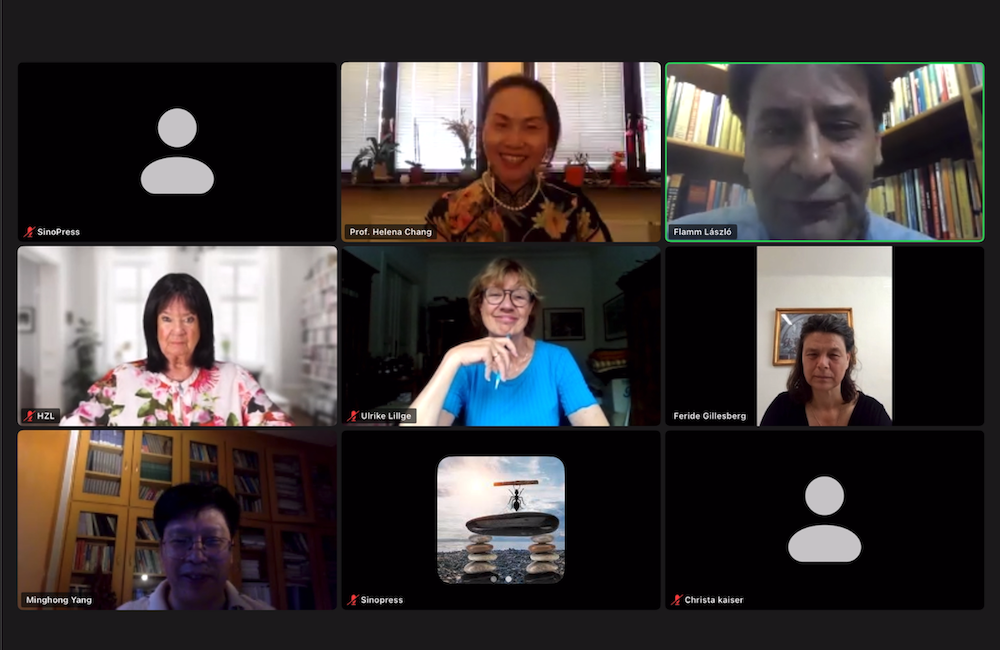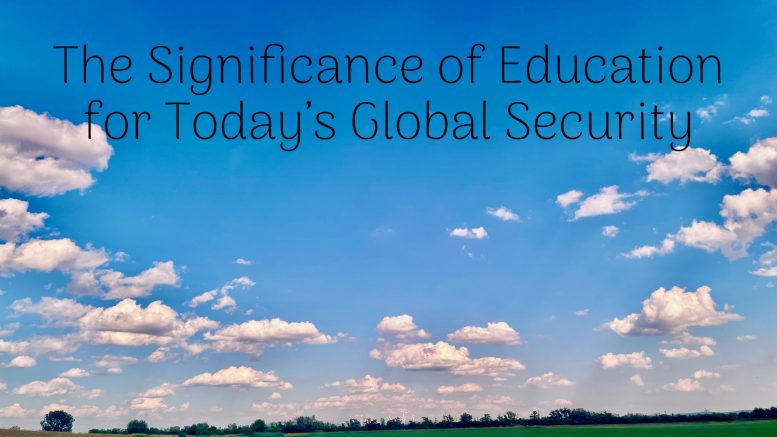On July 3, 2025, SINOPRESS held an online dialogue with Ms Helga Zepp-LaRouche, Founder and chairwoman of Schiller Institute in Germany, concentrating on the topic of “The Significance of Education for Today’s Global Security”.

As a decade-long activist for historical investigation, world economic modules and dialogue of cultures, Ms Helga Zepp-LaRouche has, not without controversy, been devoting herself to the intercultural talks with people from different regions holding different mentalities. Open-minded, she is by all means a person of courage.
The talk with her will focus on education as the most sustainable policy to secure the global peace, in contrast to geo-politics, empirical thinking, and protectionism. As Ms Helga Zepp-LaRouche put it, education means shaping aesthetic values, critical thinking and achieving open-mindedness which requires understanding of different cultures and mentalities. She mentioned the influential Chinese educator Mr. Cai Yuanpei (1868–1940), scholar and former director of Beijing University. From 1907 to 1911 and in 1912, Mr. Cai was in the University of Leipzig in Germany to study philosophy and psychology. The experience exerted enduring influence on his academic thoughts, allowing him to reshape his world view based on both Chinese and Western cultures. Schiller’s idealism is part of this process.
Ms. Feride Istogu Gillesberg, Representative of Schiller Institute in Denmark, Ms Ulrike Lilge and Ms Christa Kaiser from Schiller Institute in Germany sat in during the online session, while Dr. Laszlo Flamm from EuropaHaus Budapest in Hungary, Professor Yang Minghong from Sichuan University in China, and Mr. Martin Sörös, free-lance journalist in Austria joined the talk.
Madame Helga stresses on education as the means to shape aesthetic values, critical thinking, and open-mindedness. That requires understanding of different cultures and mentalities. The human world, however, seems not to be at its best place for that. Analyzing the problem, she said:
“Let me start with a sort of biographical approach to go deeper into the reasons why this paradigm shift in the Western culture has occurred. Let me take the example of Germany. I grew up in schools in the 1950s and the 1960s. Despite of the fact that the horror of the 12 years of National Socialism was only a few years behind us, I’m obviously born in the post-war period. I had teachers who transmitted the values of Plato, of Schiller, of the German classical period in music from Bach, Haydn, Mozart, Beethoven, Brahms, to Schuman, and naturally, Schiller. The value set went along with the humanist history of Germany.
“This was also a period where the economic values were still devoted to the common good. The medium-sized entrepreneurs would only take so much profit out of the firm which he needed to innovate and reinvest, basically, to maintain his family, but reinvested everything else back into the firm. These were values contributed to the German economic miracle, even though it started off from a rubble field. The successful German economic miracle was admired by the whole world.
“Now, in 1970, there was an education reform implemented by the OECD, which was a deliberate effort to take what they called the burden of the education of 2,500 years out of the education system. No more Plato, no more Dante, no more Shakespeare, no more Schiller. They replace those with sociology, public relations, and advertisement, so-called modernistic sciences, which I think are not very profound.
“The result is that if you look at modern days, the young people do not know these great thinkers in the European history. A lot of trouble comes from the lack of such knowledge. But if you try to get a grasp of the European history, those were highlights: The great classical period of Plato, the sort of Dark Age of the Roman Empire and its collapse, then a revival of the Greek classical period in the form of the Italian renaissance, which overcame the dark age of the 14th century. And it established the cultural foundations for 600 years of the European history to come. Naturally, you had then the German classical period, which was another highlight in the European history.
“It is my belief, and this was one of the founding principles of the Schiller Institute, which I founded 41 years ago, that the world not only needs a new, just world economic order, but that would only function if it would be combined with a renaissance of classical culture, not only in Europe, but for all civilizations and nations. And a dialogue among cultures and civilizations would only function if each would revive their best tradition, and then communicate the best tradition to the other and vice versa.
“And by getting to know the best of each, it is very easy to have dialogue and empathy, and eventually friendship and even love. Because when you discover the best contribution of another civilization, it enriches you by everything you learn. You find out that Chinese poetry, for example, is different, but very rich. Looking at Chinese poetry from the European standpoint, you discover a whole new universe. Likewise, when you discover the Chinese painting, you realize it’s very different from the European painting. You have, for example, in China, the literati painting, which is a unity of painting, calligraphy, and poetry, all in one work. That opens another window to the way how the Chinese people think. And likewise, in music and sculpture and other forms of art.
“I think that the most urgent requirement today – if we want to overcome the cultural tensions – is to strengthen the dialogue among cultures where each is emphasizing the best poetry, the best paintings, the most beautiful dramas and paintings and sculptures and architecture, and just the most beautiful expressions of the mind of each culture. And I think the Asian cultures are doing that already.
“In 2018, I participated in a dialogue of Asian cultures in Beijing. I was one of the very few Europeans participating. And I was deeply impressed by the fact that the Asian cultures, not only the Chinese one, but also those in Persia, India, and many other countries, are trying to revive their, in part, 5,000-year-old history. They are using the knowledge of that history to create a positive perspective for the future.
“In Europe, no such thing is taking place and obviously not in the United States, either. People to people dialogue of these ideas on reviving the best cultures of each side is, in my view, the key to a better understanding and peace building. Because once the best of the other, it just furthers all positive thinking. Likewise, naturally, if you only concentrate on the negative things like what they say, you did this and that negatively in history, war intention could be enabled to erupt. I would hope that out of such a talk, we could initiate exchanges to learn each other’s culture better. I think that is the door to peace.”
Talking about how to implement realistic educational programs to promote human reasoning, mutual understanding, and benefits instead of geopolitical considerations or empirical mindset, she said:
“I would strongly advise against a textbook learning, because if you only learn the written or ready-made dogmas and slogans, you’re not really learning to learn. My late husband, Lyndon LaRouche, who was an extraordinary thinker of his time, developed an approach which is very much in cohesion with Wilhelm von Humboldt, who was the German Education Minister. Humboldt was one of the Prussian reformers at the beginning of the 19th century and he shaped the Humboldt education system, which became famous all over the world. In the 19th century there was not one important professor who was not educated in the Humboldt spirit.
“The Humboldt method basically proposes that it is important that the pupil learns from great discoveries, that he or she rediscovers the qualitative advancements in knowledge in all fields, as if you would discover it afresh. In other words, you know, for example, Eratosthenes discovered the circumference of the Earth. This was almost 1,500 years before Christ, by putting a sundial into the ground, and then 50 kilometers away another sundial. By measuring the difference in the shadow, he found out the circumference of the Earth. This is an experiment which he did obviously without modern instruments, but just by thinking it through and coming up with the right hypothesis. And it is that kind of original discovery each time that the mankind made a qualitative advancement in music, in poetry, in history, and in the natural sciences. Education should be for the pupil to discover rather than to learn the result.
“What is being done in the Western schools right now is a lot of multiple-choice learning. You just tick one of three options, and that’s the result. That is very detrimental to developing the creative mentation. Humboldt also said that the goal of education is not to learn the fact, but to develop the beauty of character. Because once you have a beautiful character, you have a method of learning new things all your life, all the time until the end of your life. It’s the method of learning to learn.
“Humboldt was very much influenced by Friedrich Schiller, who famously said that the way to elevate people, to ennoble the individual, is through aesthetic education. That was his answer to the French Revolution, you know, because – this is a whole long story – he was very disappointed by the fact that the Jacobin terror had taken over a very promising process, and he wrote his “Letters on the Aesthetic Education of Man” in response to the failure of the French Revolution. And he said, from now on any improvement in politics can only occur through the ennoblement of the individual, and that ennoblement of the individual can only occur through aesthetic education, which means that the person must involve him- or herself with the creative discovery in the great art, music, poetry, drama, etc. “
Dr. Flamm from Hungary probed into the reason why traditional security tools fall short for the global security. Military interventions, sanctions, and surveillance often treat symptoms, but not causes, he said. Intervention can stop violence, but not prevent its return. Sanctions can punish regimes, but not educate societies. Intelligence can detect threats, but not build trust. On the other hand, security built on education is lasting because it’s based on understanding. As a strategic prevention method, education can accomplish what no weapon could. It builds empathy, teaching students to see others not as enemies, but as fellow humans. It fosters critical thinking, equipping young minds to resist propaganda and conspiracy theories. It creates informational resilience, empowering citizens to recognize and reject disinformation. Peace Is teachable, and it’s being taught, from Africa to South America.
To highlight the importance of education, Prof. Yang from Sichuan University, a researcher of the education module of the Tibetan Autonomous Prefecture in Sichuan Province, told the story of his friend Gonpo Tsering, a nomad son grown into an outstanding scholar. A PhD Student in Peking University in 2011, Gonpo Tsering is now professor at a university in Chengdu. Prof. Yang believes that education change people’s destiny in the positive sense, help develop economy and understand the world and thus contribute to the global peace. He has observed that more and more parents and children in the mountainous Tibetan regions get to know that and go for it.
“This is the best thing I could see, as an educator, for those living in the not quite accessible areas”, Prof. Yang said, “Gonpo can be called an example for thousands of Tibetans who go out of their hometown by school education. We have a college in Kangding, which is a normal college in the past and now a comprehensive university. I have visited this university many times and have many connections and academic cooperation with teachers there. This university is located in the valley closed at the foot of Paoma Mountain. By the way, Paoma Mountain is mentioned in the first line of the lyrics for “Kangding Love Song”, which I heard Ms Feride sings well. In 2025, It has more than 500 teachers and 13,500 students, among which 4,191students are Tibetans or from other ethnic minorities. There is a professional school called Sichuan Tibetan School, where all courses are taught in Tibetan language. It is situated in the valley closed at the foot of Paoma Mountain as well.”
Mr. Martin Sörös, an independent journalist from Austria, wrote in his speech prepared for the online exchange that he visited Sichuan Province many times, and has realized that the Tibetan community in Sichuan Province concentrates primarily in the Tibetan Autonomous Prefectures of Garzê (Ganzi) and Aba (Ngawa) in the west of the province. “Tibetan culture in Sichuan flourishes in all its diversity and is strongly influenced by Tibetan Buddhism”, he wrote, “you can see people in traditional clothing there. They speak Tibetan dialects and play Tibetan music. Festivals like Losar (Tibetan New Year) are celebrated. I also notice that monasteries still play a central role in spiritual and social life.
“The deeper one delves into the country, the more intensively one engages with its people and the truths, and the more one will understand China and its socio-economic-political system. Unfortunately, much of what one hears about China is based on assumptions and/or a lack of knowledge. Recently, before the 59th session of the Human Rights Council took place, I wrote a letter to the Office of the High Commissioner in the United Nations / Human Rights Section as an independent journalist, trying to bring my voice about China to them. But as one can imagine, the letter attracted no support, no attention, no interest.
“Education is important in this context, too. Education should not be only academic. It should lay foundation for human race to open eyes and heart to other cultures and civilizations. Only with this achievement can the Western world understand the danger of one-sided, biased view which leads to ignorance, conflicts, and security issues. I’m dreaming of such a world”.
To conclude the online session, Madame Helga said: “I think the Chinese approach to bring economic development – and naturally education is the key element of that – has done an incredible job for the harmonious development of all the different ethnic groups within China. I applaud this effort because it’s really the only way to go. China has done an enormous job by first alleviating and then eliminating extreme poverty. I have not seen that, in the EU, there is any such program to eliminate poverty. That just does not exist. So, my applause goes to China, and I always like to quote Gottfried Wilhelm Leibniz, who said that if the excellence of peoples would be judged – not like you would judge the beauty of a woman, but the value of a culture – the golden apple would go to China. And it’s my absolute conviction that Leibniz was correct.”

The online session on “The Significance of Education for Today’s Global Security” reached the agreement that aesthetic education is a powerful tool to ensure global security, as it enables more understanding of each other rather than brutal aggression due to ignorance. SINOPRESS recommends everyone to follow Schiller Institute’s events more closely, in the hope that a better world be created with Schiller’s idealism.


Be the first to comment on "The Significance of Education for Today’s Global Security, an Online Talk with Madame Helga Zepp-LaRouche"